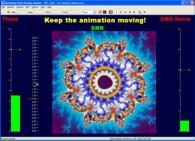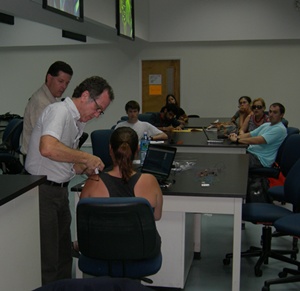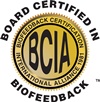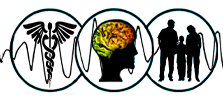Biofeedback Therapy
Biofeedback is a type of therapy which uses state-of-the-art computerized instrumentation to measure physiological information from the body and present that information back to the patient on a moment-to-moment basis so that the patient can learn to change physiology. Through this kind of moment-to-moment and accurate feedback of muscle tension, heart rate, sweat gland arousal, skin temperature, gastric motility, brainwaves, blood pressure, and respiration rate, learning to self-regulate or control these physiological systems becomes easier. Biofeedback, a human/ computer interface therapy, is much like a mirror showing what the body is doing. Just as it would be difficult to teach someone to apply make-up to the face or tie a necktie without the use of a mirror, it would be very difficult to teach someone how to control a psychophysiological response, such as shoulder of facial tension without the use of sophisticated and exacting information as used in biofeedback training.
Biofeedback displays are sometimes line graphs or bar graphs and sometimes they are animations which move when there is a change in the physiological system being measured. So, if we are teaching a person to relax by willfully warming their hands, the computer will present that change visually and with an audio tone.
Control your physiology and score points! Good for you. Feedback, novelty and praise makes for good learning!
Observing even minute changes in, say hand temperature, makes the mandala move and the brain and body learn to do it efficiently.
Since the day we were born, our physiological systems (i.e. nervous system, muscular system, immune system, digestive system, cardio-vascular system) have fine tuned and adapted to many environmental demands, such as muscles developing and coordinating with the brain to play a musical instrument or manuever a ball on the playground. When physiological systems over-react acutely, in the case of trauma, or unconsciously pick up habits over a long period of time, such as muscle bracing in a stressful environment, symptoms may develop. Biofeedback may help in controlling those syptoms.
Biofeedback therapies are used in the treatment of stress related medical disorders such as muscle tension headache, migraine headache, irritable bowel syndrome, Reynaud’s disease, fibromyalgia, back and neck pain, asthma and temporal-mandibular joint syndrome, to name a few. There are several specialties within biofeedback such as Neurofeedback (electroencephalographic biofeedback or EEG) to look at brain wave activity for the treatment of Attention Deficit Disorder, Seizure Disorder, Substance Abuse and Head Injury… and vaginal or rectal biofeedback for the treatment of pain and incontinence. Most of these these applications of biofeedback therapy have Evidence Based research and clinical application going back 30 to 40 years.


In August of 2010, I was honored to assist my colleague Michael Linden, PhD in presenting 5 workshops to the medical students at the St. George Medical University in Grenada, Caribbean. Here we are hooking up EEG electrodes on a workshop titled “Neurofeedback for treating ADD, Autism and Aspergers”.

Here’s a 1999 BBC Documentary “Natural Mystery” in which Steven Kassel talks about Biofeedback for high blood pressure and migraine headaches.
Important organizations representing the profession:


Biofeedback Certification Institute of America – Certification provides consumers with the knowledge that the practitioner has met minimum requirements for competency. BCIA has set the standard for over 30 years. Make sure that if you seek Biofeedback or Neurofeedback Therapy, your clinician is BCIA Certified.
Association for Applied PsychoPhysiology and Biofeedback
International Society of Neurofeedback and Research
Biofeedback Federation of Europe
A note about health plans: Most insurance companies used to cover biofeedback therapies when I first started in the 1980s. However, since the advent of managed care corporations, biofeedback is rarely reimbursed as it may be considered experimental, or if it is covered by the plan, it is only reimbursed for the diagnosis that each plan deems fit to pay for; what is on that specific plan’s formulary. Some plans that do pay for biofeedback, do not pay enough to cover overhead (equipment, training, supplies). Despite holding certification since 1985 by the Biofeedback Certification International Alliance, Blue Cross will not allow me to do Biofeedback or Neurofeedback with their enrollees or even see their enrollees should they desire to pay me directly for my services. By means of their non-negotiable contract, I am directed to tell their enrollees to contact them for a PhD level provider who practices biofeedback. Please make sure that any practitioner you choose maintains Continuing Education Units and is certified by BCIA.
CONSUMERS; BE AWARE! The word “biofeedback” is not patented or licensed as a profession in any of the states as are specialties such as physical therapy, psychology, nursing, etc. There are non-licensed and licensed practitioners who practice, some who hold certification by BCIA, some who do not and some who took a weekend course and bought biofeedback or neurofeedback equipment and hung out a shingle advertising this service. In fact, some practitioners who advertise buy non=clinical grade instruments on line for $100 and without training, claim to be experts! Not all biofeedback equipment is FDA approved. Before you choose a biofeedback therapist, it is important to ask them about their training, certification and experience. There is also equipment out there that is labeled as biofeedback, but is passive, or does not involve feedback of physiology to help a person LEARN to change physiology, but is not biofeedback.
